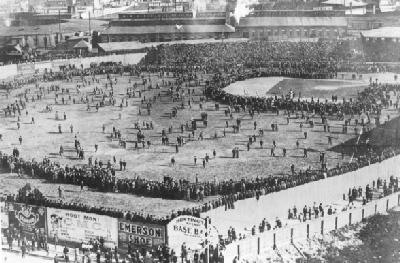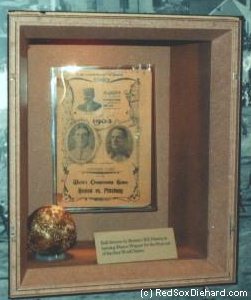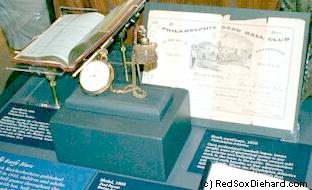|
1903: The First World Champions
Cy and Tessie Bring Home the Title
Before the 1903 season, the rival National and American Leagues came to an agreement.
The American League would be recognized as a major league, separate from but equal to the
National. In return, A.L. owners would stop raiding the rosters of N.L. teams. The American
League had a new look, as the Baltimore team had moved to New York and the Milwaukee franchise
had been relocated to St. Louis. Ban Johnson
remained in control of the American League, and when Charles Somers wanted to sell the Red Sox,
Johnson made sure that it was sold to Henry Killilea, a long-time friend of his.
Many of the
original Boston Americans from the inaugural 1901 season were still on the team - Jimmy
Collins, Hobe Ferris, Fred Parent, Chick Stahl, and Lou Criger all returned. Buck Freeman also
came back, but he had been moved from first base to the outfield. Their new first baseman was
Candy LaChance, who had been acquired in a trade for Ossee Schreckengost. Both LaChance and
young, speedy outfielder Patsy Dougherty had joined the team prior to the 1902 season.
On the pitching side, Cy Young and George Winter returned for their third seasons with the
team. Young phenom Bill Dinneen had been playing with Boston's National League team, and had
signed with the Americans at the end of 1901. "Long Tom" Hughes had been acquired half-way
through 1902, and newcomer Norwood Gibson rounded out the pitching staff.
| W | L | Pct. | GB |
|---|
| Boston | 91 | 47 | .659 | — |
| Philadelphia | 75 | 60 | .556 | 14½ |
| Cleveland | 77 | 63 | .550 | 15 |
| New York | 72 | 62 | .537 | 17 |
| Detroit | 65 | 71 | .478 | 25 |
| St. Louis | 65 | 74 | .468 | 26½ |
| Chicago | 60 | 77 | .438 | 30½ |
| Washington | 43 | 94 | .314 | 47½ |
|
Like they had in the previous two seasons, Boston got off to a slow start before taking over
the lead from the Philadelphia Athletics. Patsy Dougherty and Buck Freeman paced the offense.
Dougherty led the league in runs and hits, and Freeman topped the leaderboards in total bases,
home runs, and RBI. Dinneen and Hughes each won 20 games, but it was Cy Young who made the
biggest contribution to the Americans' success. At one point in June and July, he pitched four
consecutive shutouts, three of them by a score of 1-0. One of those wins was July 1, when he
knocked in the decisive
run himself with a double in the tenth inning. Two weeks later, he tripled in the ninth to
drive in the winning run and beat Cleveland 4-3. But it wasn't just on the field that he
performed. One day the umpire was late, so Young officiated until he arrived. On occasion, he
coached first or third base. On one July day in the middle of a heat wave, he stood outside before the
game to give free tickets to children, then pitched the game, winning of course.
By September, Boston was running away with the American League. In the National League, the
Pittsburgh Pirates were in the same position. The idea was born for a series between the two
teams at the conclusion of the season. The two owners loved the idea of getting the additional
gate receipts, and the players did, too, until they got word that they would not be paid any
additional salary. A couple of the players tried to set up some barnstorming games at the same
time as the Boston-Pittsburgh series was scheduled to be played. Eventually an agreement was
reached in which Killilea would split his share of the profits with the players, but some of
the players remained disgruntled.
The "World's Series" was scheduled to begin October 1, and would be a best-of-nine affair.
The first three games would be in Boston, followed by four in Pittsburgh, and then the final
two back in Boston. As soon as the season ended, fans and gamblers alike descended upon the
city. Betting at games was commonplace, and rumors abounded that one or more of the games in
the series were going to be fixed. With Cy Young pitching, Boston was heavily favored to win
Game One, but it was in the best (financial) interests of both teams' players to stretch the
series out as long as possible. It certainly was an uncharacteristic game. Cy Young didn't
have his usual pinpoint control, walking a season-high three batters. Lou Criger was known
for his defensive wizardry, but opposing baserunners seemed able to run at will. Buck Freeman
and Hobe Ferris made critical errors, and Pittsburgh pitcher Deacon Phillippe struck out an
unusually high number of batters.
 The next day, the two teams squared off for Game Two, and the Pirates may have returned the
favor. When starting pitcher Sam Leever came up with a sore arm in the second inning, he was
replaced by rookie Bucky Veil instead of one of the more experienced pitchers on the team.
Bill Dinneen held Pittsburgh scoreless, and the Americans won 3-0, evening the series at 1-1.
Game Three was played on a Saturday, and the crowd began gathering hours before the start of
the game. Some fans bought large blocks of $1 and $1.50 tickets and sold them for $5 or $10
on the street. Others scaled the walls of the ballpark to get in for free. It was customary
to have standing-room patrons in the outfield (in fact, it was decided that any ball hit into
the crowd would be an automatic triple, and Pirate Tommy Leach had hit such a ground-rule
triple in the first game of the series). But the crowd swarmed the field, and it took several
hours for police to push them back out of the infield so the game could be played. The fans
were so close in this game that any ball hit into the crowd was ruled a double. Pittsburgh
benefited from several such doubles, which under normal circumstances would have been routine
outs, to take a 3-0 lead. By the time the Boston bats got going, the crowd had been pushed
back further, and they didn't receive the same kind of advantage. The Pirates won the game
4-2, and led the series 2-1.
The next day, the two teams squared off for Game Two, and the Pirates may have returned the
favor. When starting pitcher Sam Leever came up with a sore arm in the second inning, he was
replaced by rookie Bucky Veil instead of one of the more experienced pitchers on the team.
Bill Dinneen held Pittsburgh scoreless, and the Americans won 3-0, evening the series at 1-1.
Game Three was played on a Saturday, and the crowd began gathering hours before the start of
the game. Some fans bought large blocks of $1 and $1.50 tickets and sold them for $5 or $10
on the street. Others scaled the walls of the ballpark to get in for free. It was customary
to have standing-room patrons in the outfield (in fact, it was decided that any ball hit into
the crowd would be an automatic triple, and Pirate Tommy Leach had hit such a ground-rule
triple in the first game of the series). But the crowd swarmed the field, and it took several
hours for police to push them back out of the infield so the game could be played. The fans
were so close in this game that any ball hit into the crowd was ruled a double. Pittsburgh
benefited from several such doubles, which under normal circumstances would have been routine
outs, to take a 3-0 lead. By the time the Boston bats got going, the crowd had been pushed
back further, and they didn't receive the same kind of advantage. The Pirates won the game
4-2, and led the series 2-1.
When the Boston Americans headed to Pittsburgh, Nuff Ced McGreevey and several hundred of
his Royal Rooters followed them. They had their own band traveling with them, and were
looking for a song to inspire their team to victory. They chose "Tessie," a popular song from
a musical. Pittsburgh took a 5-1 lead into the ninth, when the Royal Rooters began singing,
"Tessie, you make me feel so badly; Why don't you turn around. Tessie, you know I love you
madly; Babe, my heart weighs about a pound. Don't blame me if I ever doubt you, You know I
wouldn't live without you. Tessie, you are the only, only, only." The team started a rally,
scoring three runs. They ended up falling short and losing 5-4, but a new tradition was born.
The next day, the Rooters began singing in the hotel, continued as they marched to the
ballpark, and kept it up through the whole game. The Americans won Game Five 11-2, then took
Game Six 6-3. The series was tied 3-3, and Game Seven would be the final one in Pittsburgh, so
the Rooters were scheduled to leave town at the end of the game. The Pirates claimed the
weather was too poor to play, postponing the game a day in the hopes that the Rooters would
have departed by then, and giving their ace pitcher Phillippe an extra day of rest. But
Boston's supporters stayed, and Cy Young led the Americans to a 7-3 lead.
Bill Dinneen started Game Eight, and didn't come out even when his finger started bleeding
after he was hit by a come-backer to the mound in the third inning. The Americans took a 3-0
lead, and Dinneen struck out Honus Wagner for the final out, winning the game and the series
for Boston. Fans swarmed onto the field, carrying their heroes off on their shoulders.
McGreevey led the Royal Rooters in a parade around the field, and then back to the Third Base
Saloon to celebrate. As decided upon earlier, Henry Killilea gave half of his winner's share
to the players, which was divided up with each man receiving $1,182.34. Meanwhile, the
Pirates' owner Barney Dreyfuss turned his entire loser's share over to his players, and they
each netted $1,316. It remains the only World Series in which the winning players received
less money than the players they beat.
 |
 |
| Displays from the National Baseball Hall of Fame:
On the right is the ball used by Bill Dinneen to strike out Honus Wagner for the final out of the series. Above is one of the watches that were presented to each of the victorious players by the Boston Globe. |
The 1903 Boston Americans - Hitting
AB BA H 2B 3B HR R RBI SB
______________________________________________________________
1B C. LaChance 522 .257 134 22 6 1 60 53 12
2B H. Ferris 525 .251 132 19 7 9 69 66 11
3B J. Collins 540 .296 160 33 17 5 88 72 23
SS F. Parent 560 .326 170 31 17 4 83 80 24
OF B. Freeman 567 .287 163 39 20 13 74 104 5
OF C. Stahl 299 .274 82 12 6 2 60 44 10
OF P. Dougherty 590 .331 195 19 12 4 107 59 35
OF J. O'Brien 338 .210 71 14 4 3 44 38 10
C L. Criger 317 .192 61 7 10 3 41 31 5
|
Pitching
W L ERA G GS CG SHO IP H BB K
__________________________________________________________________
P C. Young 28 9 2.08 40 35 34 7 341.2 294 37 176
P B. Dinneen 21 13 2.26 37 34 32 6 299.0 255 66 148
P G. Winter 9 8 3.08 24 19 14 0 178.1 182 37 64
P T. Hughes 20 7 2.57 33 31 25 5 244.2 232 60 112
P N. Gibson 13 9 3.19 24 21 17 2 183.1 166 65 76
|
Also see
Complete statistics for the 1903 team at baseball-reference.com
1903 game log at retrosheet.org
|




